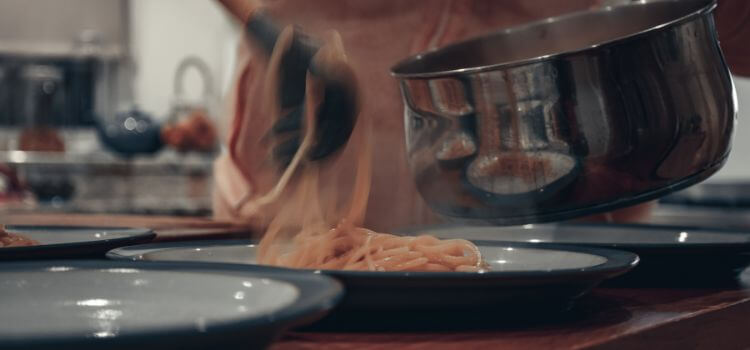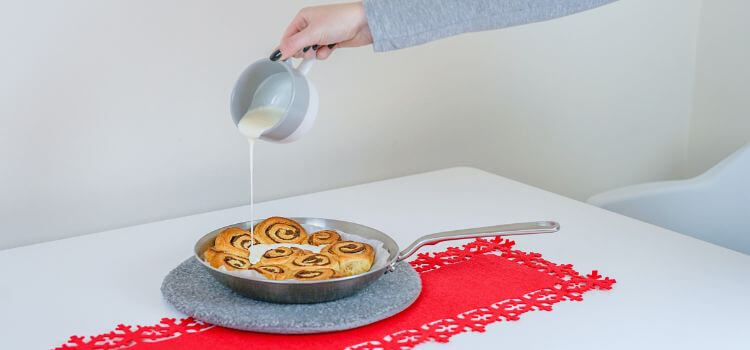As an Amazon Associate, I earn from qualifying purchases.
As an Amazon Associate, I earn from qualifying purchases
Introduction:
In the bustling world of culinary craftsmanship, selecting the right cookware is akin to choosing the perfect tool for a master artist. It’s a decision that can significantly impact the outcome of your culinary creations, from sizzling stir-fries to delicate sauces. Among the myriad of options available, two materials, titanium and aluminium, stand out as formidable contenders in the realm of kitchen essentials.
In this culinary showdown, we’ll delve deep into the nuances of titanium and aluminium cookware, shedding light on their distinct characteristics, pros, and cons. Whether you’re a seasoned chef seeking to elevate your culinary game or a home cook looking for the best investment in your kitchen, this comprehensive comparison will guide you towards making an informed choice.
The Versatile Virtue of Titanium:

Let’s begin our exploration with titanium cookware, a material that has garnered a cult following among cooking aficionados. Titanium is renowned for being extraordinarily strong for its weight, making it both remarkably light and durable.This makes it an ideal choice for those who appreciate cookware that’s easy to maneuver and built to last.
Moreover, titanium boasts impressive heat conductivity, ensuring your dishes cook evenly without any hot spots. This feature is particularly advantageous for delicate recipes that demand precise temperature control. Titanium cookware is also lauded for its non-reactive nature, ensuring that your culinary masterpieces retain their pure, unadulterated flavours.
The Allure of Aluminium:
On the other side of the culinary spectrum, we have aluminium cookware—a classic choice that has stood the test of time. Aluminum’s popularity stems from its affordability and efficient heat distribution. Thanks to their superior thermal conductivity, aluminium pans and pots heat up swiftly, reducing cooking times and energy consumption.
However, bare aluminium cookware can sometimes react with acidic or alkaline ingredients, imparting a metallic taste to your dishes. To counter this, most modern aluminium cookware is coated with nonstick or anodized layers, mitigating the risk of flavour contamination and making it a safer choice for a broader range of recipes.
Features of Titanium Cookware:
- Exceptional Durability: Titanium cookware is renowned for its incredible strength and resilience. Its durability is enhanced by its ability to tolerate elevated temperatures and its resistance to dents and scratches.
- Lightweight Design: Titanium is widely recognised as a lightweight metal that finds extensive application in the manufacturing of cookware. This feature makes it easy to handle and ideal for chefs who require precision in their cooking.
- Superb Heat Distribution: Titanium’s excellent heat conductivity ensures even heat distribution across the cooking surface, preventing hot spots and allowing for uniform cooking.
- Non-Reactive Surface: Titanium exhibits non-reactivity, hence indicating its resistance to engage in chemical interactions with acidic or alkaline substances. This ensures that your dishes maintain their natural flavours and colours.
- Easy to Clean: Many titanium cookware pieces come with a nonstick coating, which makes them relatively easy to clean. Food residue tends to slide off the surface, reducing the need for excessive scrubbing.
Pros of Titanium Cookware:
- Efficient Cooking: Titanium heats up quickly and evenly, reducing cooking time and energy consumption, making it an energy-efficient choice.
- Lightweight and Manoeuvrable: The lightweight nature of titanium cookware makes it easy to handle, flip, and toss ingredients, perfect for recipes that require precision.
- Longevity: Titanium cookware is incredibly durable and resistant to wear and tear, ensuring it can withstand years of heavy use without losing its quality.
- Non-Reactive: Its non-reactive surface preserves the natural taste and quality of your ingredients, which is particularly crucial for delicate dishes and sauces.
- Versatile Usage: Cookware made of titanium can be used with gas, electric, or induction stovetops, giving you more options when it comes to cooking techniques.

Cons of Titanium Cookware:
- Pricey Investment: When compared to other materials, high-quality titanium cookware can be somewhat pricey, which limits its accessibility for customers on a tight budget.
- Nonstick Coating Wear: Over time, the nonstick coating on titanium cookware can wear off, requiring replacement or re-seasoning to maintain its performance.
- Not Ideal for High-Heat Searing: Titanium cookware may not be the best choice for high-temperature searing, as it can discolour or lose its nonstick properties under extreme heat.
- Limited Colour and Style Options: Titanium cookware typically comes in a limited range of colours and styles, which may not suit everyone’s aesthetic preferences.
- Not Dishwasher Safe: While some titanium cookware is labelled as dishwasher-safe, hand washing is often recommended to prolong its lifespan and prevent damage to nonstick coatings.
In conclusion, titanium cookware offers exceptional durability, efficient cooking, and non-reactive properties but comes with a higher price tag and requires proper care to maintain its nonstick surface. It’s an excellent choice for chefs and home cooks seeking long-lasting, high-performance cookware.
Frequently Asked Questions (FAQs) about titanium cookware:
Titanium cookware is exceptionally durable because titanium is a robust and resilient metal. It can withstand high temperatures, resist scratches and dents, and is less prone to wear and tear compared to other materials.
The lightweight nature of titanium cookware makes it easy to handle, particularly for dishes that require precision cooking. It allows for effortless flipping, tossing, and manoeuvring of ingredients.
Yes, many titanium cookware pieces are compatible with induction stovetops, thanks to titanium’s excellent heat conductivity. Because of its adaptability, it may be used with a variety of stovetop types and cooking techniques.
Due to its non-reactivity, titanium is indifferent to both acidic and alkaline substances.This property ensures that the flavours, colours, and quality of your dishes remain unaltered, making it ideal for cooking delicate recipes and sauces.
Users should be aware that quality titanium cookware can be relatively expensive. Additionally, the nonstick coating on some titanium cookware may wear off over time, requiring maintenance. It’s also important to note that extreme high-heat searing may not be suitable for titanium cookware, as it can affect its appearance and nonstick properties. Proper handwashing is often recommended to prolong its lifespan.
These FAQs provide essential information for those considering titanium cookware as a valuable addition to their kitchen arsenal.
Features of Aluminium Cookware:
- Excellent Heat Conductivity: Aluminium is known for its exceptional heat conductivity, which ensures quick and even heating of the cookware’s surface, preventing hot spots.
- Affordability: Aluminium cookware is often more budget-friendly compared to other materials like stainless steel or copper, making it accessible to a wide range of consumers.
- Lightweight Design: Aluminium is a lightweight metal, making it easy to handle and suitable for everyday cooking tasks.
- Compatibility with Different Cooktops: Most aluminium cookware is compatible with various cooktops, including gas, electric, and induction, providing versatility in cooking methods.
- Nonstick and Anodized Options: Many aluminium cookware pieces come with nonstick coatings or anodized surfaces, which improve their nonstick properties, durability, and resistance to corrosion.

Pros of Aluminium Cookware:
- Efficient Cooking: Thanks to its excellent heat conductivity, aluminium cookware heats up quickly and evenly, reducing cooking time and energy consumption, which can lead to energy savings.
- Affordable: Aluminium cookware is often more budget-friendly than other materials, making it an attractive choice for those on a tight budget.
- Lightweight and Manoeuvrable: The lightweight nature of aluminum cookware makes it easy to handle and manipulate, making it ideal for tasks that require precision and control.
- Compatibility: Aluminium cookware is compatible with a wide range of cooktops, making it versatile and suitable for most kitchen setups.
- Nonstick Options: Nonstick coatings on aluminium cookware make it easy to release food and simplify the cleaning process, reducing the need for excess oil or fat when cooking.
Cons of Aluminium Cookware:
- Reactivity with Certain Foods: Bare aluminium cookware can react with acidic or alkaline ingredients, potentially imparting a metallic taste to your dishes. This can be mitigated with nonstick coatings or anodized surfaces.
- Durability Concerns: Aluminum cookware may not be as durable as some other materials, and it can be susceptible to dents, scratches, and warping over time.
- Prone to Staining: Aluminium cookware may stain or discolour when exposed to certain foods or cooking techniques, impacting its appearance.
- Nonstick Coating Wear: Over time, the nonstick coating on aluminum cookware can wear off, leading to reduced nonstick performance and the need for replacement.
- Not Suitable for Induction Cooking (in some cases): While some aluminium cookware is induction-compatible, not all aluminum pans or pots can be used on induction cooktops without an additional magnetic base.
In summary, aluminium cookware offers excellent heat conductivity, affordability, and versatility but may require caution with reactive foods and can be less durable than other materials. It’s a popular choice for those seeking efficient and budget-friendly cookware, especially when nonstick or anodized options are preferred.
Frequently Asked Questions (FAQs) about aluminium cookware:
Yes, aluminium cookware is known for its excellent heat conductivity, which allows it to heat up quickly and evenly, reducing cooking time and energy consumption.
Indeed, the taste of your food may change if acidic or alkaline components come into contact with bare aluminium cookware. To mitigate this, many aluminium cookware pieces come with nonstick coatings or anodized surfaces.
Aluminium cookware exhibits compatibility with a diverse range of cooktops, encompassing gas, electric, and induction options. However, it’s essential to check the specific product’s compatibility, as not all aluminium cookware is induction-ready.
The lifespan of nonstick coatings can vary depending on usage and maintenance. Over time, these coatings may wear off, leading to reduced nonstick performance. Proper care can extend their lifespan.
Aluminium cookware may not be as durable as some other materials, and it can be susceptible to dents, scratches, and warping. However, nonstick coatings and anodized surfaces can enhance its durability and resistance to corrosion.
These FAQs provide valuable information for individuals considering aluminium cookware for their kitchen and address common questions regarding its features and advantages.

The Showdown: Which Is Right for You?
As we embark on this culinary journey, you’ll discover that the choice between titanium and aluminum cookware ultimately depends on your specific needs and preferences. Are you seeking lightweight, durable pans for quick, precise cooking, or do you prefer the affordability and versatility of aluminum with the protection of nonstick coatings? Perhaps, the perfect choice lies somewhere in between.
So, whether you’re a gourmet chef, a weekend culinary warrior, or simply someone looking to upgrade their cookware collection, our titanium vs. aluminium cookware comparison will serve as your trusted guide. Together, we’ll navigate the exciting world of culinary craftsmanship, ensuring that your choice of cookware becomes an extension of your culinary artistry.
Amazon and the Amazon logo are trademarks of Amazon.com, Inc. or its affiliates.
Leave a Reply